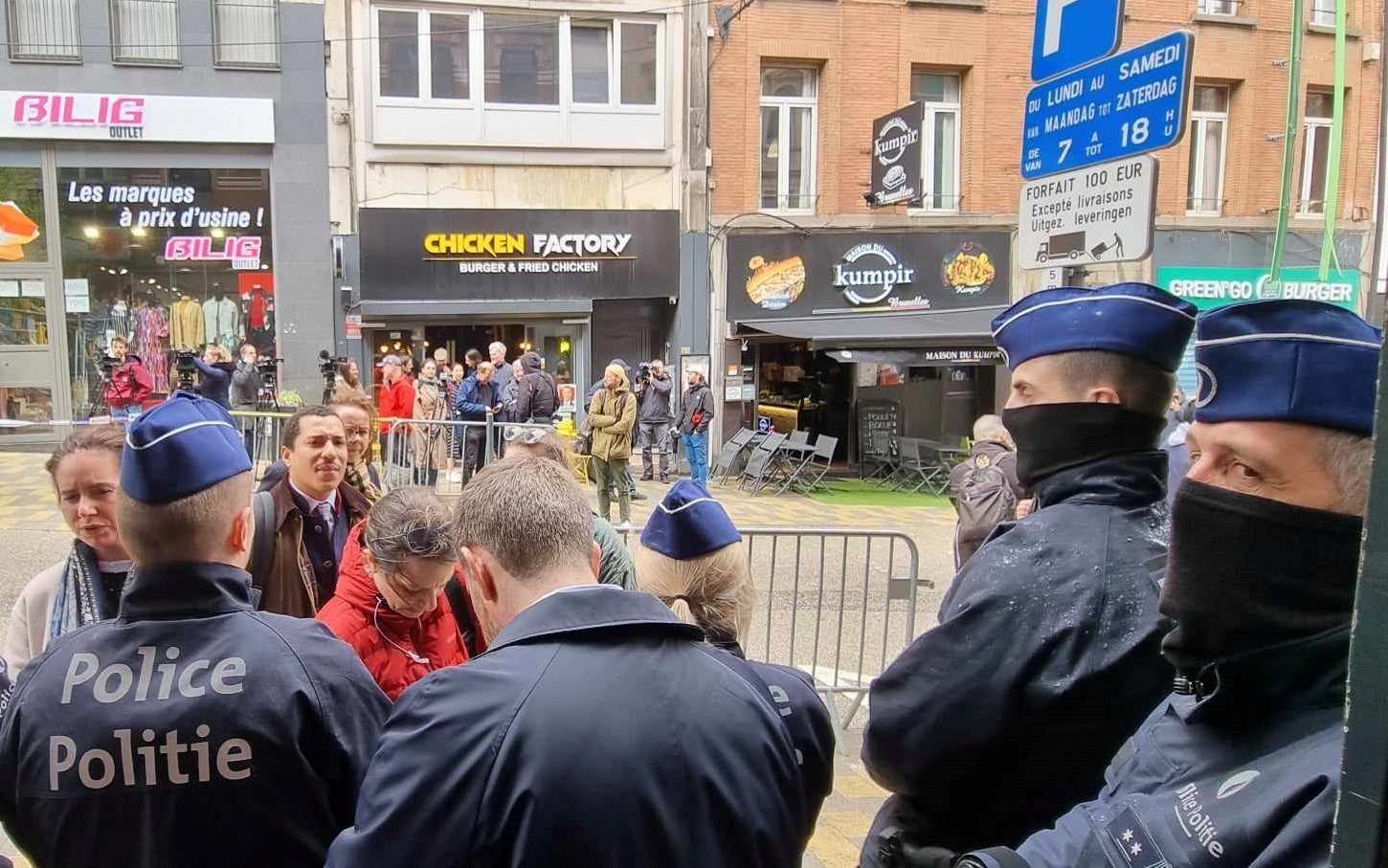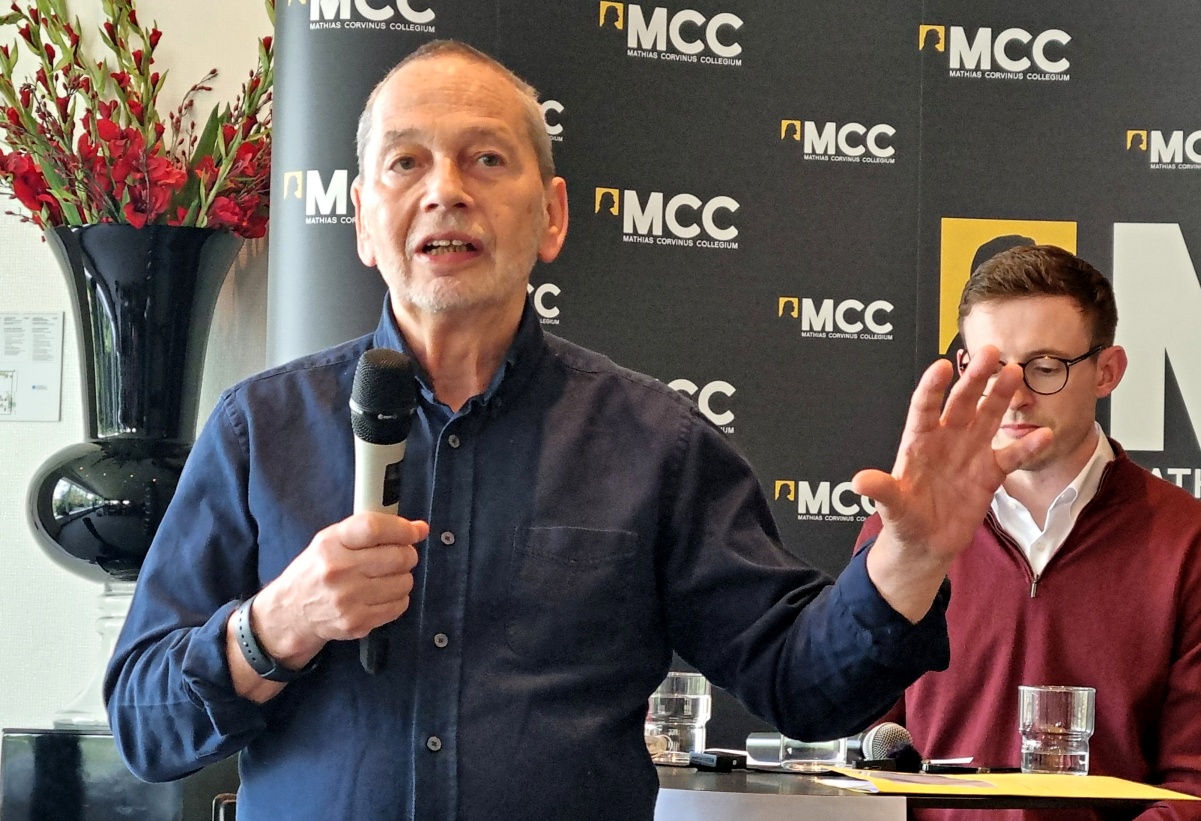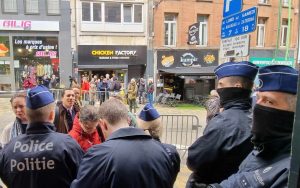
Police have tried to shut down the event, as demanded by Brussels' socialist mayor.Continue reading

We have visited Prof. Frank Füredi, Director of the Hungarian-funded Mathias Corvinus Collegium (MCC) Brussels, in his offices in the Belgian capital. We have asked him about the progress they made since their establishment in 2022, as well as his thoughts on the unprecedented scandal at the recent National Conservatives (NatCon) conference where MCC Brussels was part of the organizing team.
One and a half years since its establishment, MCC Brussels is going stronger than ever, now with a well rounded team of experts. When we last spoke you have set aside a goal saying that you want to demolish the “political quarantine” around Hungary. How is this undertaking going?
Public life in Western Europe is more polarized than ever before. It is almost impossible for the different sides to even talk to each other never mind to argue substantively. So we have to change many deeply embedded perceptions. What we have managed to do is to ensure that MCC Brussels is taken seriously even by our opponents and that therefore what we say cannot be simply ignored or cannot simply be denounced as far-right or fascist. There are people who try to do that but what is interesting is that our work has been recognized, and we have become one of the top think-tanks in Brussels. I even noticed that the press has become much more open towards us than previously.
Is it the development of the past few days or is it a long term process?
It is long term. We go through a relationship where if the media loves you or they agree with us then they can no longer simply write us off. They have to report in a neutral way, and we got to a point when I am sometimes cited and quoted on different issues, I am not referred to as Frank Füredi, the “far-right populist”, etc. but as Frank Füredi, director of MCC Brussels.
We have managed to gain recognition and I feel that we have moved up from the kind of ghetto that they tried to impose on us, and I think that is a remarkable success.
They cannot pretend that you do not exist any longer, I assume.
No, and sometimes they even inflate our importance. We were involved in the farming protest, we helped them build a network. Basically we just tried to get people to gather from different countries and write some reports that they could use. And then we have a situation where someone like French President Emmanuel Macron gives a speech and talks about how the farmers protest is organized by a Hungarian think-tank in Brussels, which is a fantasy. But it is an indicator that they are well aware of our presence even in Paris.

Street view in Brussels with graffiti calling the state “racist’, and claiming that borders are murderers. Photo: Hungary Today
The MCC in Budapest, the mother organization, is mainly an educational institution. It gives diplomas, offers courses. Is it fair to say that MCC Brussels is different, in terms that it is more of a classical think-tank, rather than an educational institution as the one in Budapest?
Not entirely, we do do a lot of educational work as well. Many of us love teaching and that is my profession. Students are coming here and we hold lectures for them in Brussels. But if you want to simply educate people you can do it anywhere. In contrast, we are here in Brussels to accomplish certain objectives that have to do with policy, with political ideals, an intellectual focus on projecting an alternative to the dominant narrative in Brussels. So maybe we are more of a politically oriented think-tank than the MCC in Hungary, because our job is to represent an alternative view, not just educating kids.
How far are your media contacts, the public and policy professionals aware that this is a venture, an enterprise of a Hungarian origin? How far do you want them to realize this or make this explicit in your work, namely that this has roots back in Hungary and it is growing from a Hungarian value system and narrative?
Everybody is well aware that this is a Hungarian organization. I often make the point that our logo refers to a Hungarian organization. Our job is not just simply to represent the outlook of Hungary and present all the intellectual achievements of Hungary, but also that of Europe.
What we are working towards is to show that our ideals, those that spring form the Hungarian perspective, are also important and relevant to other societies.
The work we are doing here has a direct relevance for their lives as well. When we published our report on agriculture, this was taken up by farmers in Italy, Spain and many other places. But we are a Hungarian organization even though we have people from all over the world working for us. Everybody knows that we are Hungarian, in fact people who are in contact with us go on about Hungary all the time and even when we have speakers from other countries, they never stop talking about Hungary. It is like an obsession.
You have a lot of international experts working here, young people, etc. Are they introduced to this unique Hungarian “hutzpah”, the Hungarian national narrative, national conservatism? Are they introduced to the context of where all this resistance and all this struggle is originating from? Do they understand the roots of this originating back in Hungary?
Yes, they even go to Hungary sometimes. I noticed that they are “more Hungarians than a Hungarian”. That is because when you commit to a certain project and you are under pressure, you begin to think of yourself in a slightly different way. So they really identify with Hungary’s predicament, and I am very proud of the way they stand up for the kind of values and ideals that we take seriously.
Conservatives often criticize the US or major European powers for what they call “democracy export”. That involves infusing smaller countries in central-eastern Europe with their value system, what they call democracy. Is not it a little bit ironic that this is in fact what you are doing, exporting democratic thinking from Hungary back to the heart of the European system?
A little bit, but you know, I always made the point that our Hungarian values are basically what is best for Hungary. We are not saying that the way we link our culture to the past, the way we give that a political expression is the same they should do in Italy or anywhere else, because what gives credit to Hungarian intellectual and cultural ideals is that they are rooted in a particular historical experience and you cannot replicate that. If you do it, it becomes quite shallow. What we are saying is that as Hungarians we are also Europeans. And as Europeans we have certain ideals in common and certain common challenges. This is what we are really dealing with. We are exporting something but it is not to transform people into ones like us, but to encourage them to take up their own intellectual arms and fight for freedom, democracy, tradition, all the values that are really important for us.
During the recent NatCon conference your think-tank made headlines in the world media for standing up to attempts to silence conservative speakers. Do you see these events as a watershed moment for MCC Brussels, something that you have been working towards?
Well not just MCC Brussels, but Brussels as such, and the whole of the European Union. What happened on Tuesday (April 16) this week was that the three mayors that tried to cancel us overplayed their hands and even people who are on the other side could see that there is something really unpleasant about the way they just casually said that people like us cannot be heard. “We will not allow you to have a voice in Brussels”, and that is something that reminds you of a quasi-totalitarian milieu. This was very important because at that point everyone could see that everything that we have been saying about the nature of the political elites in Belgium, but also in large parts of Europe, is actually true.
You cannot take freedom for granted. These people are not the guarantors of freedom.
In that particular moment people were able to see that we are playing a very important role in leading the fight for freedom. This was also a watershed moment also for Hungary because I am sure that after this event, in the European Parliament and municipal election campaign, the issue of freedom will come up in a sense that our critics have often accused us of a rule-of-law deficit in Hungary, or of democratic backsliding.

NatCon Brussels. Photo: Hungary Today
Do you think that people will refer here to this moment in Brussels as a counterpoint?
Exactly.
If you want to see a violation of the rule-of-law, come to Brussels!
This is really important.
You have received a lot of publicity for your stance during the NatCon crisis, with front page news after the day when the police raided the venue. But with that comes a certain risk that you are now under the limelight and your adversaries, political foes will focus on your activities a little bit more. Are not you concerned about them dedicating more resources towards attacking you and undermining your work?
I think they will, but they would do so anyway because of the upcoming Hungarian EU presidency.
But you have demonstrated to everyone involved just how dangerous simply saying the truth can be…
That kind of pressure is something that you can either see as a problem or as an opportunity. From here on this pressure will force me and some of my colleagues to think better, to develop our ideas, to learn how to argue more clearly, to be more creative in how we deal with public life. To me that is a test and when a think-tank is under that kind of pressure, it is forced to rise to the occasion. I am certain that it will bring out the best from us, it will force us to become better than we are at the moment, more sophisticated and more flexible.
Why is it not the big leading nations of Europe that are taking up the fight for free-speech and democracy in this changing world? Why is it little Hungary, a small country in Central Europe that is taking a leading role?
Because of its history, because of how often Hungary was occupied by foreign powers. It always faced a threat to its independence. It often faced situations where its freedom was undermined or questioned. I think that there are a lot of people in Hungary that would take freedom more seriously. It is not that they would develop a particular philosophy around freedom rather, it is part of their lives, freedom is something that you have to go out and find.
I always remember an incident, involving a football match in Wolverhampton, where Hungary was playing England. Some of my friends were there and they were telling me that the Hungarian fans, there were very few of them as compared to the English fans, were being pressurized and attacked physically. And the locals were so impressed by the way Hungarian fans fought back. I do not think they were conceptualizing freedom at that moment there at all, but they just intuitively stood up and fought. That was a nice and important moment, while Hungary actually also won the game. I remember my wife telling me at that point, when we were watching the game on TV and we heard the English fans whistling when the Hungarian Anthem was played, that “I bet you Hungary will win because the are going to get so angry”. And that is what happened.
Do you think we still have that mentality?
A little bit yes, more than most people in Europe.
But this is the exact argument that they are turning against us. The Soviet invasion of 1956 is mentioned so many times in the context of refugees when they are saying – „Europe had accepted you when you were refugees in ’56.” Or now with the Ukrainian war – „1956 was when we stood by you and you should understand how it is to be occupied.” But you are turning this upside down when you are saying that on the contrary, our current resistance springs from historic experiences such as 1956. These gave us the spiritual and intellectual means of resistance. Is that right?
Yes, 1956 was very special. The truth is, as you know, we were left on our own. I still remember at the age of 9, going after my father on the streets and looking at the skies because we thought NATO had come. And the European media broadcasted the message that “the West will stand by you”. Then nothing happened, we were left completely isolated. So when you are aware of the fact that this outcome is always a possibility, then you have to understand that you must take your independence very seriously. That is what Hungary is doing.
Featured Image: Hungary Today